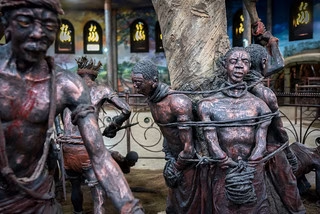Uganda Martyrs Shrine in Namugongo.A Sacred Landmark of Faith and History.
The Uganda Martyrs Shrine in Namugongo is one of the most significant religious sites in Uganda, revered for its historical and spiritual importance.
This site commemorates the Uganda Martyrs, a group of Christian converts who were executed for their faith by Kabaka Mwanga II of Buganda in the late 19th century.
The shrine attracts millions of visitors annually, serving as both a place of pilgrimage and a symbol of resilience and devotion.
Location of Uganda Martyrs Shrine in Namugongo
The Namugongo Shrine is situated about 15 kilometers northeast of Kampala, making it easily accessible by car or public transport.
The History of the Uganda Martyrs
In the late 1800s, as Christianity spread through Buganda, it created tension with the traditional customs and political authority of the Kabaka.
Many converts, inspired by their newfound faith, refused to follow orders that conflicted with Christian teachings.
Kabaka Mwanga II, fearing the growing influence of Christianity and viewing it as a threat to his authority, ordered the execution of 45 men who had embraced the faith.
These men, including 22 Catholics and 23 Anglicans, were subjected to horrific deaths between 1885 and 1887.
On June 3, 1886, a group of Catholic martyrs, led by Saint Charles Lwanga, were burned alive at Namugongo. This day is now observed annually as Uganda Martyrs’ Day, honoring their sacrifice and commitment to their faith.
The Catholic Martyrs Shrine in Namugongo
The Catholic Shrine, located at the site where the martyrs were executed, is an iconic structure designed to resemble a traditional African hut.
This unique architectural style reflects the unity and inclusiveness of the church, welcoming pilgrims and visitors from all walks of life.
Key Features of the Catholic Shrine
Main Basilica
The central dome of the shrine is awe-inspiring, symbolizing the spiritual connection between earth and heaven. Inside, the tranquil atmosphere encourages prayer and reflection.
Martyrs’ Relics
The shrine houses relics of the martyrs, including items linked to Saint Charles Lwanga. These relics provide a tangible connection to the past and inspire deep reverence.
Memorial Gardens
Surrounding the shrine are lush gardens that offer a serene space for meditation and quiet contemplation.
The Anglican Martyrs Shrine.
Located close to the Catholic shrine, the Anglican Shrine honors the Anglican martyrs who also sacrificed their lives during the same period.
Though more modest in scale, this site is equally significant, serving as a powerful reminder of the shared history of Christian martyrdom in Uganda.
Features of the Anglican Shrine
A peaceful chapel for worship and reflection.
Memorial plaques detailing the story of the Anglican martyrs.
Beautifully landscaped grounds that enhance the spiritual experience of visitors.
Martyrs’ Day Celebrations
Every year, on June 3, the Namugongo Shrine becomes the epicenter of Uganda Martyrs’ Day celebrations. Pilgrims from all over Uganda, Africa, and beyond converge on the shrine, some undertaking arduous journeys on foot as a sign of devotion.
Special Masses
Led by clergy from Uganda and the Vatican, these masses honor the martyrs’ legacy.
Cultural Performances
Traditional music and dance reflect the rich heritage of Uganda while celebrating the faith.
Storytelling
Pilgrims recount the martyrs’ sacrifices, keeping their memory alive for future generations.
Significance of the Uganda Martyrs Shrine
Spiritual Significance
The shrine is a beacon of faith, symbolizing the triumph of spiritual commitment over adversity. Pilgrims come to seek blessings, deepen their faith, and honor the martyrs’ courage.
Historical Importance
The Uganda Martyrs Shrine represents a pivotal moment in Uganda’s religious history.
The martyrs’ sacrifice laid the foundation for the growth of Christianity in the country, influencing both cultural and spiritual life in Uganda.
Tourism and Education
As a major religious and cultural attraction, the shrine draws tourists and scholars interested in Uganda’s history. Guided tours offer insights into the martyrs’ story, the architecture of the shrines, and the broader historical context.
Best Time to Visit
June 3 (Martyrs’ Day)
For a deeper experience, the Martyrs Day celebration at Namugongo is on 3rd June, and on this day lots of crowds come to the place for mass celebrations from around the world.
Weekdays
For a quieter and more personal experience, visit on weekdays.
What to Bring to the Uganda Martyrs Shrine in Namugongo
- Modest attire to respect the sanctity of the site.
- Comfortable walking shoes for exploring the expansive grounds.
- A notebook or journal for personal reflections.
The Uganda Martyrs Shrine in Namugongo is more than a place of worship—it’s a testament to unwavering faith, a cornerstone of Uganda’s history, and a hub of spiritual rejuvenation.
Whether you visit as a pilgrim or a history enthusiast, the shrine offers an unforgettable experience that underscores the resilience and devotion of the human spirit.
By visiting Namugongo, you not only honor the martyrs’ legacy but also partake in a journey of faith, reflection, and discovery.



